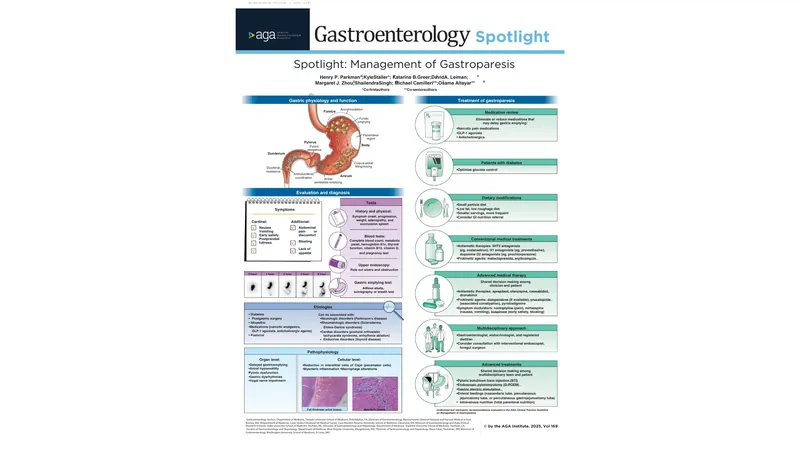
Shocking Link Between Atopic Eczema and Suicidal Thoughts Uncovered in Massive Global Study
2025-09-19
Author: Wei
The Hidden Dangers of Atopic Eczema
A groundbreaking global study involving over 30,000 adults from 27 countries has unveiled a harrowing link between atopic eczema and suicidal ideation, revealing that the condition’s impact stretches far beyond the skin.
Delphine Kerob, a consultant dermatologist from Saint Louis Hospital in Paris, highlighted the severity of these findings, stating, "The effects of atopic eczema are more than skin deep, and suicidal thoughts are a serious concern that healthcare professionals often overlook."
Eczema's Psychological Toll
The research builds on previous evidence indicating that atopic eczema imposes a significant psychological burden, with afflicted individuals facing a 14% increased risk of depression and a staggering 17% higher chance of anxiety compared to those without the condition. Additionally, many patients endure social stigma and daily struggles to manage their skin issues.
Insights from the 'Scars of Life' Study
During the 2025 European Academy of Dermatology and Venereology (EADV) Congress in Paris, findings from the 'Scars of Life' study were presented, showcasing data from 30,801 adults aged 18 and older. Conducted between June and September 2024, this extensive study sought to shed light on the psychosocial burdens tied to atopic eczema.
Among participants, 15,223 had physician-diagnosed atopic eczema, while 7,968 did not. Those with eczema hailed from varied age groups, with researchers focusing on when their symptoms first appeared: childhood, adolescence, or adulthood.
Astounding Statistics on Suicidal Ideation
The study disclosed that 13.2% of individuals with atopic eczema reported suicidal thoughts, in stark contrast to 8.5% of those without. Remarkably, no matter when eczema began, the likelihood of experiencing suicidal ideation was significantly higher among those affected: adults with adult-onset eczema had an odds ratio of 1.56, adolescent-onset showed 1.71, and childhood-onset depicted 1.72.
Key Factors Fueling Suicidal Thoughts
Further analysis uncovered critical risk factors linked to suicidal ideation among eczema patients, including: - **Age**: Young adults (under 30) were 31% more susceptible to suicidal thoughts compared to older adults. - **Gender**: Males reported higher rates of suicidal ideation. - **Obesity**: Overweight patients faced heightened risks, with 20.6% of them reporting suicidal thoughts.
Those suffering from moderate to severe eczema were found to have double the odds of contemplating suicide, amplifying the urgency for healthcare providers to take these findings seriously.
The Importance of Sleep and Stigmatization
Sleep disorders also played a crucial role, with participants expressing significant stigmatization and frequently suffering from mixed insomnia. This was linked to suicidal ideation, underscoring the intertwined nature of mental and physical health.
Moving Forward
Kerob emphasized the need for healthcare professionals to identify these risk factors to better support the well-being of eczema patients. Ongoing investigations aim to unravel why rates of suicidal thoughts differ across countries, potentially uncovering significant cultural factors. The 'Scars of Life' study continues to deepen our understanding of the complex and often hidden battles faced by those living with atopic eczema.




 Brasil (PT)
Brasil (PT)
 Canada (EN)
Canada (EN)
 Chile (ES)
Chile (ES)
 Česko (CS)
Česko (CS)
 대한민국 (KO)
대한민국 (KO)
 España (ES)
España (ES)
 France (FR)
France (FR)
 Hong Kong (EN)
Hong Kong (EN)
 Italia (IT)
Italia (IT)
 日本 (JA)
日本 (JA)
 Magyarország (HU)
Magyarország (HU)
 Norge (NO)
Norge (NO)
 Polska (PL)
Polska (PL)
 Schweiz (DE)
Schweiz (DE)
 Singapore (EN)
Singapore (EN)
 Sverige (SV)
Sverige (SV)
 Suomi (FI)
Suomi (FI)
 Türkiye (TR)
Türkiye (TR)
 الإمارات العربية المتحدة (AR)
الإمارات العربية المتحدة (AR)